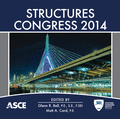Finite Element Modeling of Carbon Nanofiber Concrete Structural Members
Publication: Structures Congress 2014
Abstract
Concrete is the most synthetic material in the world and the most usable in the construction industry. Improving the problem of cracks and increasing tensile strength of concrete while maintaining its ductility in tension has always been essential. Since the discovery of carbon nanotubes/fibers in 1992 and recent advances in materials science, they are considered efficient fibers to be used in construction materials such as concrete. Previous experimental work has shown that incorporation of CNF in cementitious composites can enhance the mechanical behaviour of material by reducing the size of macro- and microcracks to nano-sized cracks, resulting in higher strength and ductility. Electrical properties of CNF give unique properties to concrete, which makes this fiber more beneficial compared to other fibers. Carbon nanofiber is a highly conductive electrical material which makes concrete highly conductive as well. In addition, due to tunnel conductivity effect, CNF concrete exhibits properties necessary for self-sensing ability. The electrical properties required for strain monitoring and damage evaluation of concrete is improved by CNF fibers. To date, exploitation of nanotechnology in concrete on a commercial scale remains limited with few results. This study aims to expand upon the use of such fibers in structural members. A general finite element model is developed to simulate structural members with CNF concrete. The model is based on fiber beam element formulation and accounts for the inelastic flexural and shear behavior of members. The FE model is validated against experimental results and the structural performance of CNF-reinforced concrete members is then evaluated. A comparison between members with CNF concrete against conventional concrete is made from the structural performance point of view. Results and discussion about the potential benefits of CNF concrete in structural applications are then presented.
Get full access to this article
View all available purchase options and get full access to this chapter.
Information & Authors
Information
Published In
Copyright
© 2014 American Society of Civil Engineers.
History
Published online: Apr 9, 2014
Authors
Metrics & Citations
Metrics
Citations
Download citation
If you have the appropriate software installed, you can download article citation data to the citation manager of your choice. Simply select your manager software from the list below and click Download.
